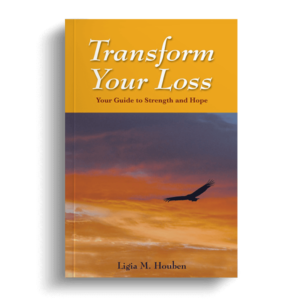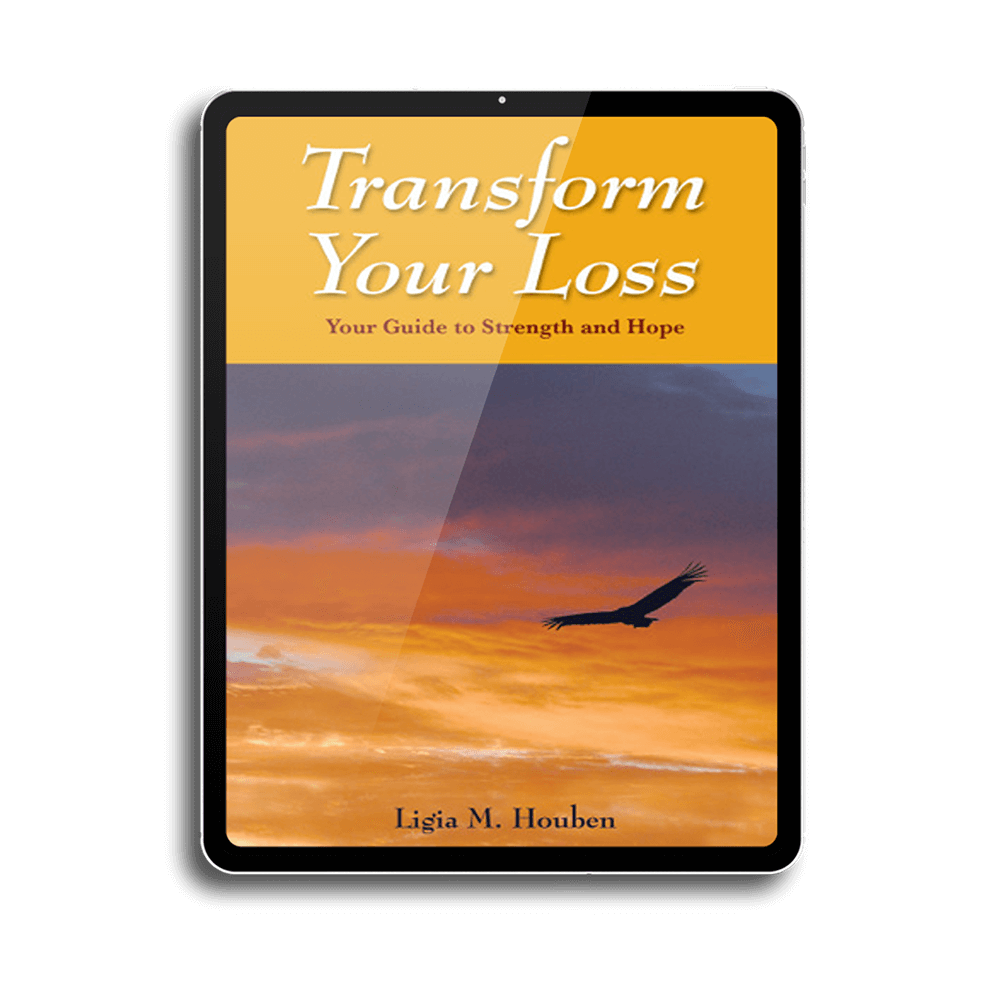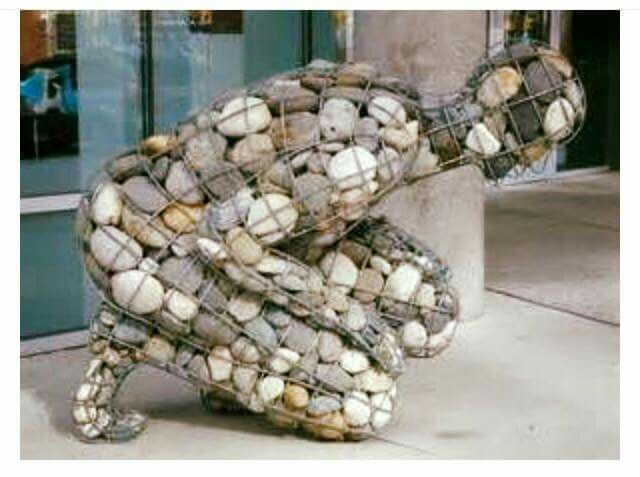
by Ligia Houben | Jun 14, 2020 | Blog US
I understand that facing the death of a loved one is not easy, because we miss that person every day. But remember that even if this person is not physically present, their memories will always live on. We can transform the relationship we had with that departed person, since the bonds of love will continue after they have passed from this life. Although these ties are invisible, they are as precious as gold. These bonds with our loved ones can inspire us to forge a life with a higher purpose and greater meaning. But to endure a loss of great magnitude we must be compassionate with ourselves and allow ourselves time to suffer and grieve. The tears and comforting conversations are necessary. There is no defined time for processing our grief. We each process grief at our own pace.
Ligia M. Houben
Transform Your Loss. Your Guide to Strength and Hope.
Don’t tell me to move one.
Don’t tell me she is in a better place.
Don’t tell me she lived a long life.
Don’t tell me she would like to see me happy.
Don’t tell me to be strong.
Don’t try to console me.
Let me be with my grief. It is a sacred place, as I am grieving so much, because I loved my mother so much.
Her love will remain in my heart next to my father. I know it will be a time when my suffering will be transformed into the most beautiful spiritual experience. I know this because that is what I want to happen.
However, right now, I want to be here. Still, in silence. One with my pain and my beloved mother’s memories. I want to be fully present to my pain because I know it will be the only way to release the suffering.
I said in my book, Transform Your Loss. Your Guide to Strength and Hope, that we learn to live with our loss.
It is not a matter to forget or move on…it is a matter of moving forward with my beloved mother’s love, her inspiration, her joy, and her faith, in my heart.
For now…let me be still.
Ligia M. Houben

by Ligia Houben | May 20, 2020 | Blog US
[vc_row][vc_column][vc_column_text]We are living unprecedented times where things just shifted.
We still need to keep social distancing and the way we live changed.
Many people are working from home. Many people are buying houses virtually.
Many people are Zooming for therapy. Many people are doing their groceries with Instacart.
Some people welcome the shift to digital. They find it comfortable and convenient.
Some other people resist the digital world. They need the physical contact. They may feel isolated.
Those are the ones that say “but I prefer it in person.” Being a hugger, I can totally understand it.
However, at times like this, we make the choice to either welcome it or resist it. It depends how we see it.
What if we welcome connecting with others, even if we are not with them in the same room?
For many years, I taught virtually for Kaplan University, and we held weekly seminars.
My students were always surprised to feel how connected we were, despite of being thousands of miles away.
We can be close to each other, from heart to heart.
Make that Whatsapp call; that Zoom meeting. Reach out to others today, and connect from your heart.
And, if you are able to visit with the other person, remember to keep social distance. It’s for you. It’s for them.
I wish you a beautiful day,
Ligia M. Houben[/vc_column_text][/vc_column][/vc_row]
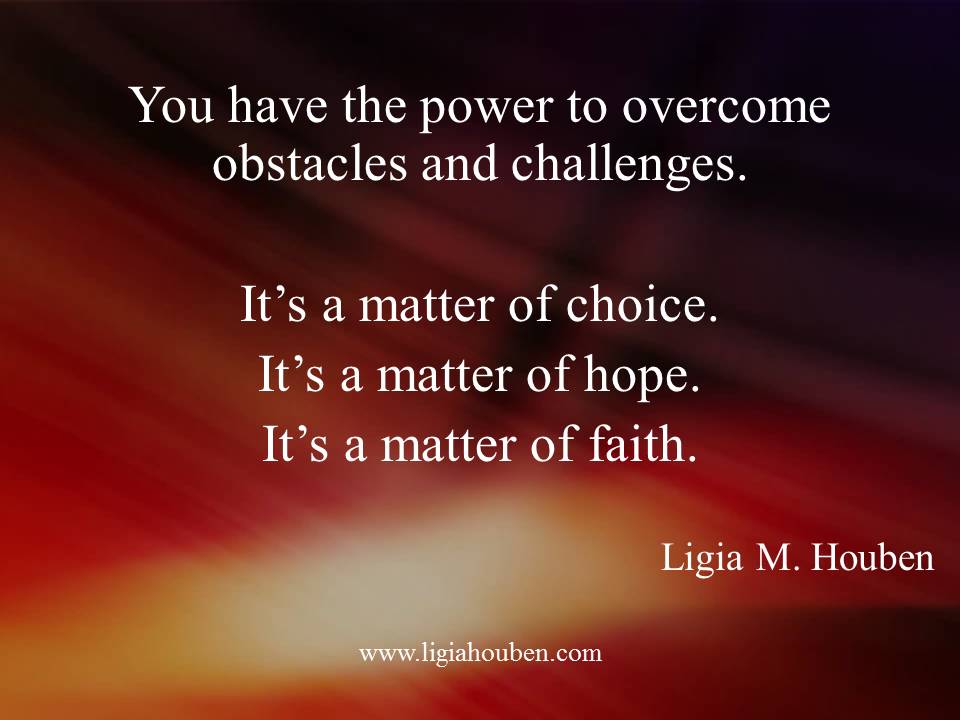
by Ligia Houben | May 6, 2020 | Blog US
Do you find yourself wondering what has happened to your old self?
Have you lost connection with who you are? Do you feel lost and without any direction?
There is a loss that seems to be prevalent in our society. It is the loss of identity. As you face this crisis, it seems this type of loss is especially prevalent.
When we talk about losses, many people assume we are only referring to the death of a loved one. However, there are other real losses that are not recognized or acknowledged. The loss of identity is one of them. For the last year and a half, I have been traveling nationwide presenting the seminar Transforming Grief and Loss, for mental health professionals. In every single seminar, the loss of identity comes up as a frequent loss among adults and adolescents. How does this happen? How do you lose your sense of self? It may happen gradually or abruptly. In this article, we will explore both and will find ways to make that re-connection, as the most important relationship is the one you have with yourself.
What is this word called identity?
It is the set of characteristics and beliefs that define you; that makes you who you are. We live in a society where the first question people ask when we are introduced to someone is: What do you do? But, what we do may not be who we are. Or is it? If what you do professionally defines who you are, then, that is your identity. What happens if you lose your job or if you retire? How do you define self? How do you know you are suffering the loss of identity?
Let’s explore these examples:
– Loss of identity is when a man faces a financial crisis and needs to sell his fancy house and move to a small apartment. He always took pride in being recognized as the owner of the “most beautiful house in the block.” Now, he may avoid saying where he lives because he had identified himself as being the owner of the house. Now he feels worthless.
– Loss of identity is when a wife feels complete only when she is with her husband and only does what he allows her to do, but tells her friends her husband allows her to be herself. Loss of identity is when there are no boundaries between who “she is” and who her husband wants her to be. It is when a marriage instead of being 11 is 1+1=2.
– Loss of Identity when talking about the loss of a loved one, is when the person has identified themselves as the spouse of someone. When they become a widow or a widower, who are they? The same may happen with divorce. When one is no longer a couple it can also produce a sense of losing one’s identity.
One of the losses I want to bring to our attention is the loss of homeland, which can be experienced by many immigrants, as they need to start a new life in a foreign country. The following extract is taken from my book Counseling Hispanics through Loss, Grief, and Bereavement. A Guide to Mental Health Professionals (pp 113-114):
The way the members of a culture identify it has an impact on how they perceive the world and how they behave…As Thomas and Schwarzbaum (2006) observed, “Personal identity is cultural identity. Culture is a powerful organizer of people’s lives. How we view ourselves and who we are as individuals, cannot be separated from when, where, and how we grew up” (p. 1)
In a previous newsletter, I asked you to answer the question “Who I Am?” It is an exercise I do with most of my clients as it is extremely insightful. When we are facing a change or a loss in our lives, we may ask ourselves that question. Keep in mind that if you depend on external factors-what you do-what you have-who is next to you-who accepts you-who rejects you-how many awards you have- you may be depending on these factors to create your identity.
However, you create your identity as you connect with your essence and live according to your values, without depending on another person or role to define who you are. If who you are depends on the person you are with, you have lost your uniqueness, which is your essence.
In our guided meditation classes held at The Center for Transforming Lives, we focus in making that connection with our inner self; with our essence.
Why do you think the mindfulness movement is so powerful? Because as a society we have lost that connection and we are hungry for it. You may be grieving your loss of self. However, you can re-define who you are. It may be challenging and take some effort.
HoDo you find yourself wondering what has happened to your old self?
Have you lost connection with who you are? Do you feel lost and without any direction?
There is a loss that seems to be prevalent in our society. It is the loss of identity.
When we talk about losses, many people assume we are only referring to the death of a loved one. However, there are other real losses that are not recognized or acknowledged. The loss of identity is one of them. For the last year and a half, I have been traveling nationwide presenting the seminar Transforming Grief and Loss, for mental health professionals. In every single seminar, the loss of identity comes up as a frequent loss among adults and adolescents. How does this happen? How do you lose your sense of self? It may happen gradually or abruptly. In this article, we will explore both and will find ways to make that re-connection, as the most important relationship is the one you have with yourself.
What is this word called identity?
It is the set of characteristics and beliefs that define you; that makes you who you are. We live in a society where the first question people ask when we are introduced to someone is: What do you do? But, what we do may not be who we are. Or is it? If what you do professionally defines who you are, then, that is your identity. What happens if you lose your job or if you retire? How do you define self? How do you know you are suffering the loss of identity?
Let’s explore these examples:
– Loss of identity is when a man faces a financial crisis and needs to sell his fancy house and move to a small apartment. He always took pride in being recognized as the owner of the “most beautiful house in the block.” Now, he may avoid saying where he lives because he had identified himself as being the owner of the house. Now he feels worthless.
– Loss of identity is when a wife feels complete only when she is with her husband and only does what he allows her to do, but tells her friends her husband allows her to be herself. Loss of identity is when there are no boundaries between who “she is” and who her husband wants her to be. It is when a marriage instead of being 11 is 1+1=2.
– Loss of Identity when talking about the loss of a loved one, is when the person has identified themselves as the spouse of someone. When they become a widow or a widower, who are they? The same may happen with divorce. When one is no longer a couple it can also produce a sense of losing one’s identity.
One of the losses I want to bring to our attention is the loss of homeland, which can be experienced by many immigrants, as they need to start a new life in a foreign country. The following extract is taken from my book Counseling Hispanics through Loss, Grief, and Bereavement. A Guide to Mental Health Professionals (pp 113-114):
The way the members of a culture identify it has an impact on how they perceive the world and how they behave…As Thomas and Schwarzbaum (2006) observed, “Personal identity is cultural identity. Culture is a powerful organizer of people’s lives. How we view ourselves and who we are as individuals, cannot be separated from when, where, and how we grew up” (p. 1)
In a previous newsletter, I asked you to answer the question “Who I Am?” It is an exercise I do with most of my clients as it is extremely insightful. When we are facing a change or a loss in our lives, we may ask ourselves that question. Keep in mind that if you depend on external factors-what you do-what you have-who is next to you-who accepts you-who rejects you-how many awards you have- you may be depending on these factors to create your identity.
However, you create your identity as you connect with your essence and live according to your values, without depending on another person or role to define who you are. If who you are depends on the person you are with, you have lost your uniqueness, which is your essence.
In our guided meditation classes held at The Center for Transforming Lives, we focus in making that connection with our inner self; with our essence.
Why do you think the mindfulness movement is so powerful? Because as a society we have lost that connection and we are hungry for it. You may be grieving your loss of self. However, you can re-define who you are. It may be challenging and take some effort.
However, you make the choice.
Do you want to continue grieving for who you were or make that shift and re-connect with who you are from the inside out?
Are you ready to make the choice?
I hope you do, as nobody can do it for you.
Remember, your life has meaning.
Ligia M. Houbenwever, you make the choice.
Do you want to continue grieving for who you were or make that shift and re-connect with who you are from the inside out?
Are you ready to make the choice?
I hope you do, as nobody can do it for you.
Remember, your life has meaning.
Ligia M. Houben
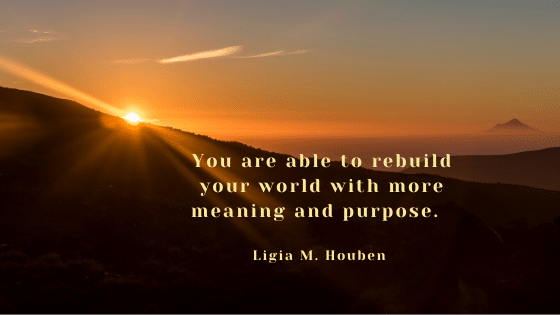
by Ligia Houben | Apr 12, 2020 | Blog US
As we talk about the topic of how our world changed because of the Covid-19, I want to let you know my heart is with you and your loved ones.
On Wednesday, April 8th, I did a Facebook Live, and I talked about how our world changed. I intended to help others deal with all these emotions and find ways to handle this challenging situation.
So, what has happened?
When we started in 2020, we may have had high expectations. We may have had plans we wanted to realize, or dreams to fulfill. Suddenly, in the first trimester, all this changed. Our world changed, and we may find ourselves feeling different emotions, and do not know what to make out of this.
What has happened is that we are experiencing the loss of our assumptive world, which is the world we know, our reality. When something happens to that world, and it drastically changes, as it has occurred with the Covid-19 pandemic, our world may shatter.
At least it gets off balance. We start wondering what we are going to do. What is happening with your emotions? You may be experiencing intense sadness; loss of appetite or you may not be able to sleep at night. You are grieving, and you have not named your feelings, grief.
Grief is the natural and unique response to a loss, and at this moment, we are experiencing multiple losses. We have lost our sense of safety, our sense of freedom, our sense of connection.
We may have lost a loved one, lost our health, or lost our job. We are experiencing a collective loss and personal losses. Furthermore, you may be going through a loss already, like the loss of your loved one, and this situation added a layer to your grief.
You ponder about the uncertain future, and you feel a knot in your stomach. You may be experiencing anticipatory grief if the future looks grim.
Keep in mind that the only thing we have now is today. What we can do today is to handle what is under our control. The Covid-19 happened. That is out of our control.
Still, we can control our behavior following the guidelines to take care of ourselves and others.
Something else we can do, which can change the way you feel is our thoughts. Pay attention to your thoughts, and if these are negative or go to the future, shift them. You can always reframe them. Based on how you think, you feel, and based on how you feel, you act.
Always say to yourself, “I can do this.” It’s about being empowered. It is to avoid being defined by a situation. To get a new perspective, I want to suggest you do this exercise:
Write on a paper the answers to these questions:
Who was I before the Covid-19?
What was important to me?
Who were the important people in my life?
After you respond to those questions, answer the following:
Who am I now at these challenging times?
How am I handling the Covid-19 situation?
What am I doing that is under my control?
What am I doing for myself?
What am I doing for others?
Lastly, ask yourself:
Who do I want to be after Covid-19?
What changes do I want to make after this is over?
Because even if we feel this will be this way forever, it will pass the way we are experiencing it now. Nothing lasts forever. We don’t know when, but it will.
So, who do you want to be? What type of person? How would you want to have evolved because of this?
What is going to be important to you? Maybe you are realizing now that the life you were living was not in line with your values.
Furthermore, it could be that now you are embracing new values.
As a society, we can also do this. Who are we going to be as a society? It is an opportunity to reflect; to connect with your inner self. It is an opportunity to realize the unique person you are.
You have control over who you want to be.
Remember, your life has meaning; the lives of your loved ones have meaning; the life of every single person in the world has meaning. Let’s live accordingly.
I wish you well. I will you health. I wish you hope.
Ligia M. Houben
www.the11principlesoftransformation.com

by Ligia Houben | Mar 16, 2020 | Blog US
We are living times that may bring us a sense of disbelief, helplessness, and shock.
Because of an unprecedented situation due to the Covid-19 pandemic, our lives have been drastically disrupted, changing the concept of the world as we know it. To all those people who have suffered due to the Coronavirus I accompany them with all my heart.
There has been a loss of our assumptive world. And what is this assumptive world? It is the understanding we have of our reality. It is based on our beliefs, surroundings, what keeps us grounded and safe. When this world shatters for any reason, it can bring us a sense of disbelief, a sense of insecurity, a sense of loss.
How can we respond to this threat that is compromising our sense of wellbeing at all levels? First, understanding that we cannot control everything and accepting our new reality. It is a new world right now, and it’s necessary to pay attention to the things we can still manage, and these are our behavior, our communication with others, and our mindset.
Because of these changes, we may experience disturbing emotions such as anxiety, fear, and hopelessness. It is understandable we feel this way as we may endure situations such as social isolation, lack of control, and insecurity for the future. Furthermore, because this pandemic can be fatal, it may take us to an existential crisis regarding our mortality. Instead of being scare of such reality, we can transform it into an opportunity to re-evaluate our lives and pay attention to what really matters.
To help you navigate this difficult time, I want to share with you the following tips:
Stay informed without obsessing about this situation. Pay attention to the sources of information; this includes social media.
Stop worrying about “what if.” The future is uncertain. There is a difference between planning and worrying. Prepare yourself in a responsible manner and live today.
Be realistic and plan what you can do during these times of uncertainty. Recognize what you have control over and what you do not.
Take this time to reflect on what is essential in your life. Do some journaling about it; this may allow you to review your values and live accordingly.
Be mindful of your behavior and act responsibly. Refrain from alarming conversations.
Finally, pay attention to your thoughts. If these are disturbing, change them. Always remember TEA:
Thoughts, Emotions, Actions.
Based on how you think, you feel, and, based on how you feel, you act.
Remember, your life has meaning.
Ligia M. Houben, MA, FT, CGC, CPC
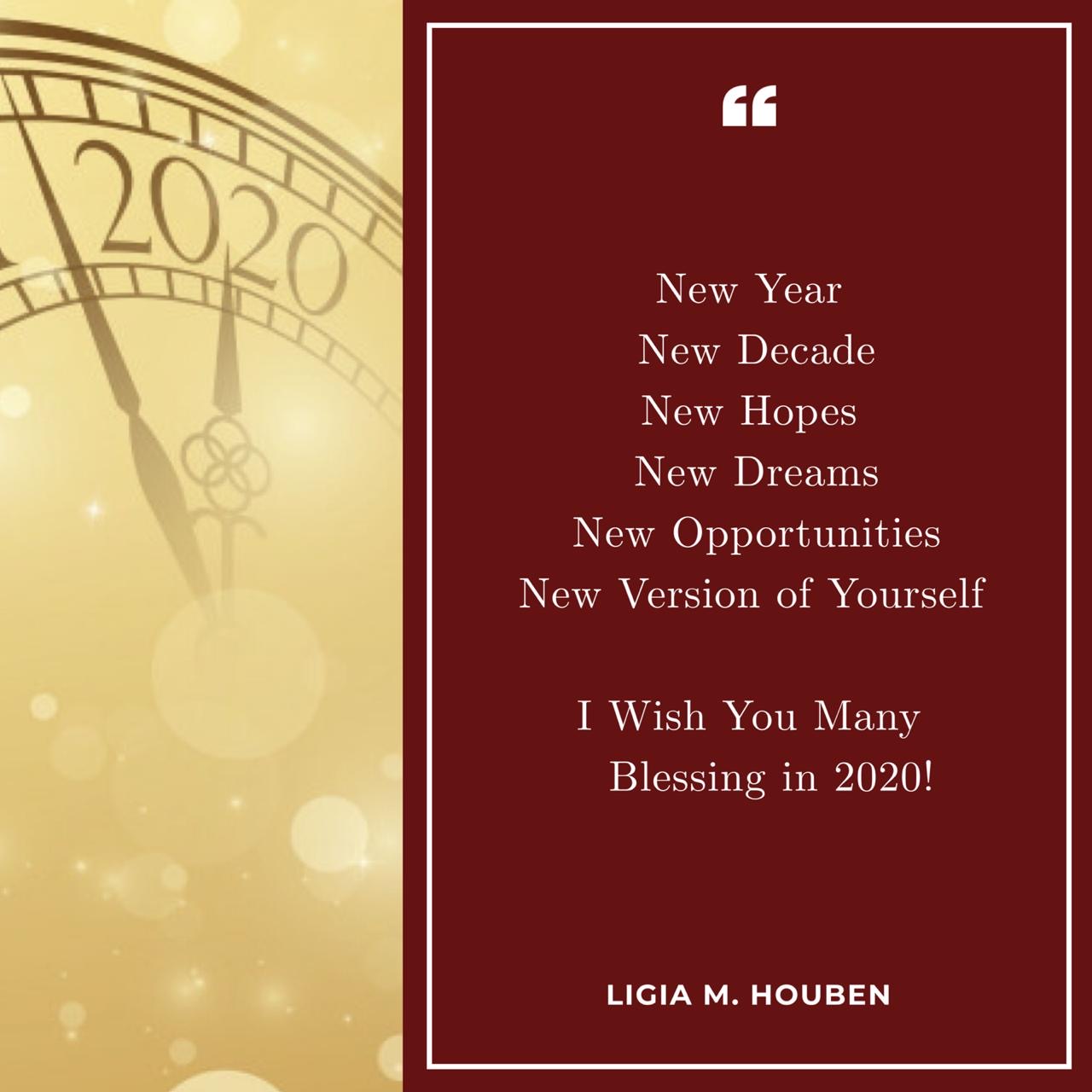
by Ligia Houben | Dec 31, 2019 | Blog US
December is a month filled with festivities. People spend time in celebrations, taking advantage of the sales of the season, and sharing time with family and friends. We are exposed to many stimuli and may not take the time to reflect, to be with ourselves, to take a break. Still, it is now, when the year is almost over and we are about to start a new one, that we can take a pause and reflect on what this year meant to us.
Many of us may be in a cheerful mood for a year filled with positive changes, good outcomes, and fulfilling life experiences. On the other hand, we may wish the year to be over because things did not work out the way we expected. We encountered disappointments, or we faced a major loss in our lives.
In which of these two groups of people are you? Are you celebrating with joy or are you grieving in your heart, pretending to be happy? If you belong to the first group, I am happy for you! Keep counting your blessings and realizing your purpose in life.
If you belong to the second group….my heart is with you. Still, I want to remind you of the special person you are and to use the amazing resources you have to deal with challenges and difficulties. It is a matter of choice. It is a matter of perspective.
You may not have been able to control some of the things
that happened to you this year, still, you can choose to let go of the painful
baggage you are carrying in your heart, and welcome 2020 with hope and
strength.
Even if you do not see it now, you also have blessings in
your life. Count them! Focus on what you have and do not dwell on what you do
not have.
Keep an open mind and open heart for the year to come. We
may not be able to change the past, however, we can plan our future and use our
strengths to make it happen.
With the purpose of helping you evaluate your year and plan
for the next one, I prepared the following questions:
• How was your life experience in 2019?
• Which was your happiest moment?
• Which was your most difficult time?
• How did you handle it?
• What regrets do you have?
• What did you learn?
• How can you apply these lessons as you plan 2020?
• What is the greatest goal you want to achieve in 2020?
• How can you make it happen?
As you answer all these questions, open your mind and your
heart. Only in being real with ourselves we can create a life based on our
principles and values.
Our life is a gift…let’s unwrap it with care.
I wish you a meaningful 2020!
Ligia M. Houben







